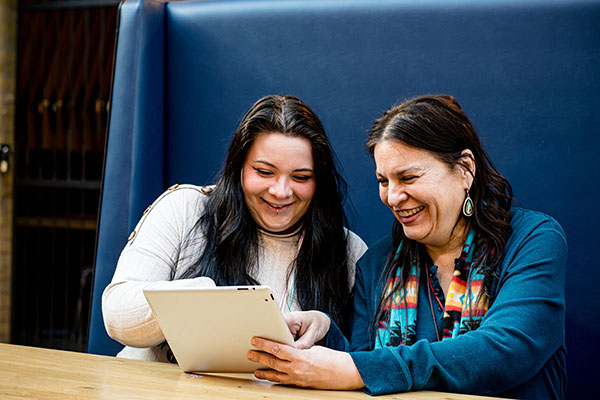Indigenous Health at the CFPC
 In 2022 the CFPC made a Declaration of Commitment to Cultural Safety and Humility in Health Services Delivery for First Nations, Inuit, and Métis People in Canada. Through this public and long-term commitment, we have pledged to collaborate with the Indigenous Physicians Association of Canada. Together, with the Indigenous Health Committee, we strive to promote culturally safe care and actively address racism experienced by Indigenous people in accessing health care in Canada.
In 2022 the CFPC made a Declaration of Commitment to Cultural Safety and Humility in Health Services Delivery for First Nations, Inuit, and Métis People in Canada. Through this public and long-term commitment, we have pledged to collaborate with the Indigenous Physicians Association of Canada. Together, with the Indigenous Health Committee, we strive to promote culturally safe care and actively address racism experienced by Indigenous people in accessing health care in Canada.
Indigenous Health Initiatives
The CFPC’s Virtual Talking Circle event series
The CFPC hosts Virtual Talking Circle events to gather CFPC members and staff to learn about and discuss our role in reconciliation. Some of these events are Mainpro+® certified.
The next Virtual Talking Circle event will be held in September 2024.
-
February 2024 – Mainpro+ Certified – Truth & Reconciliation Commission Calls to Action 18–24
The Truth and Reconciliation Commission’s Calls to Action provide specific recommendations to address historical injustices and acknowledge the impact of residential schools. Calls 18 to 24 of the Truth and Reconciliation Commission’s Calls to Action, authored by residential school survivors, relate directly to the health care system.
To obtain your certified credits for this session, please respond to this poll, answering the reflective questions.
Evaluation survey -
September 2023 – The CFPC’s Declaration of Commitment to cultural safety and humility
In 2022 the CFPC made its commitment to cultural safety and humility in health services delivery for Indigenous peoples across Canada. In this first event, we come together to explore what this commitment means for the organization and why it is significant and offer an opportunity to discuss how we can all engage in the process of reconciliation.
CanMEDS-FM
 Indigenous Health Supplement
Indigenous Health Supplement
This Indigenous supplement to the CanMEDS-FM 2017 competency framework helps family physicians provide high-quality care that aligns with the needs and circumstances of Indigenous peoples living in Canada.
Read the full supplement
Infographics
Each infographic focuses on a specific leadership role a family physician plays when promoting the health of Indigenous people at the individual, practice, and community levels.
The CFPC's Actions on the Recommendations of the Truth and Reconciliation Commission of Canada
 The CFPC is dedicated to advocating for improvements in the health care of Indigenous people. Our Indigenous Health Committee brings together champions in this area who facilitate and contribute to the CFPC’s efforts to achieve equitable health outcomes.
The CFPC is dedicated to advocating for improvements in the health care of Indigenous people. Our Indigenous Health Committee brings together champions in this area who facilitate and contribute to the CFPC’s efforts to achieve equitable health outcomes.
Learn more about how the CFPC is addressing the Calls for Action of the Truth and Reconciliation Commission of Canada.
-
Ways to honour the National Day of Truth and Reconciliation
The CFPC recognizes the National Day for Truth and Reconciliation on September 30th, which is also known as Orange Shirt Day. This day holds profound significance as we collectively acknowledge and reflect upon the painful history of the residential school system and its devastating impact on Indigenous peoples, families, and communities across Canada.
As we pause on September 30th to listen to, learn from, and stand with Indigenous peoples, we encourage you to:- Learn about the tragic legacy of residential schools
- Wear an orange shirt or an orange ribbon from an Indigenous business or company, such as the Orange Shirt Society to show your support
- Volunteer your time at First Nations, Inuit, or Métis-led events marking the observation of Orange Shirt Day
- Watch The Unforgiven, a short film about the health and well-being of Indigenous peoples in Canada and reflect using the Indigenous Health Committee resource list for the film
Be mindful of Indigenous colleagues during this sensitive time. Please consider ways you can advance learning opportunities within your working environment that do not ask more of Indigenous colleagues.
Featured
Award-winning medical student and her family physician mom share their medical school experiences in Q&A
Taking steps on the journey of truth and reconciliation
The CFPC commits to equity and humility in Indigenous health
On November 10, 2022 the CFPC, with the Indigenous Physicians Association of Canada, signed a formal Declaration of Commitment to Cultural Safety and Humility in Health Services Delivery for First Nations, Inuit, and Métis People in Canada.
Read more.
The CFPC’s statement on addressing systemic racism on Indigenous people
The CFPC acknowledges the tragic death of Joyce Echaquan, an Atikamekw woman, and the racism she experienced in her final hours as deplorable and unacceptable. We send our sincerest condolences to her family, community, and nation. Read more.
Related resources
Crisis line
If you need support, please call the Indian Residential Schools Crisis Line at 1-866-925-4419.
